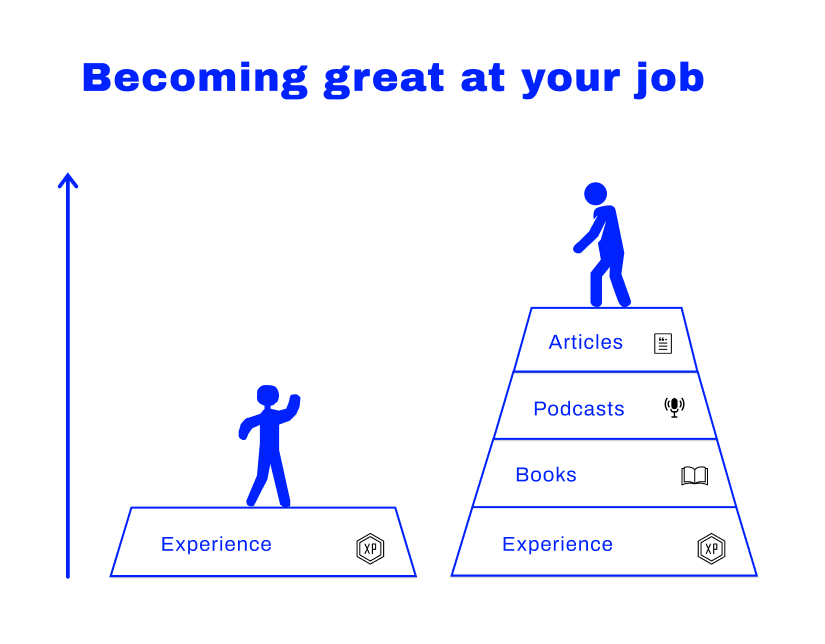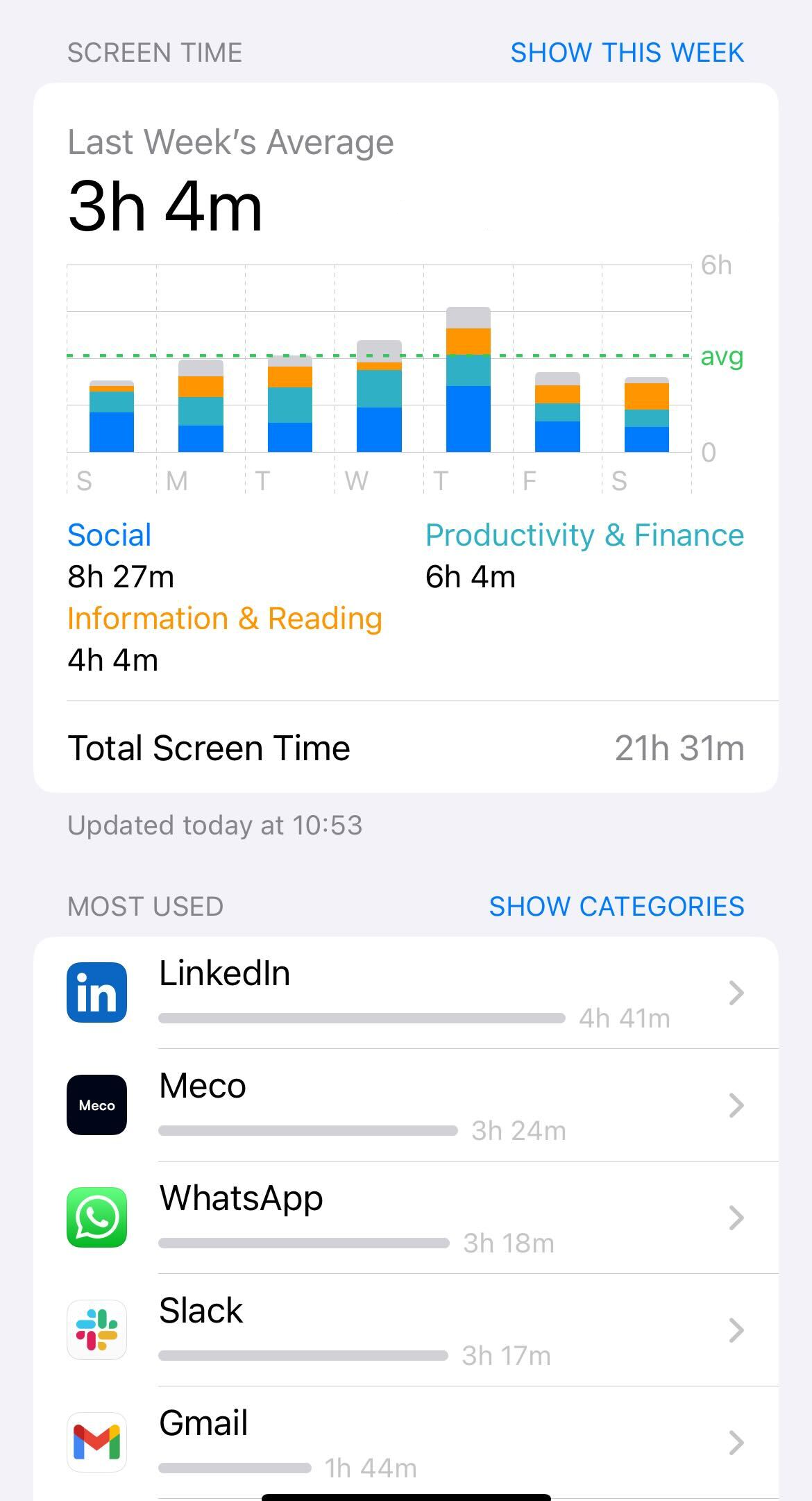How to Keep Up With All the Digital Content
How to keep up with all the digital content #
Excerpt #
Consuming 100+ newsletters, 8-10 podcasts, and 3-4 books a month
The biggest problem in 2024 is not finding good content, it is finding the time to go through it all.
It seems like every day I find a new newsletter to subscribe to, a podcast to listen to, or a book to read.
After A LOT of trial and error, I finally landed on a system that lets me read 100+ newsletters, listen to 8-10 podcasts, and read 3-4 books a month.
I have 4 main guidelines:
Great content will find you, set a high bar.
The ‘Listen to songs, not albums’ principle.
Never be stuck.
Have a manageable backlog, don’t hoard.
Today, I’ll cover each of the guidelines, and share specific tactics for each of the mediums:
Articles
Podcasts
Books
I know the article is a bit off-topic, but I know that a lot of engineering leaders struggle to keep up with the crazy pace, and I hope to give you some tips to make your life easier.
Most of the content I consume relates to my job as an engineering manager - I feel it plays a huge role in my career, and makes me much better at my job.
[

The principles #
1. Great content will find you, no FOMO #
If you keep hearing about a podcast episode, an article, or a book - it’s a good sign it is worth consuming. Remember that most articles are just repeating the same ideas.
The truly good pieces will bubble up - set a high bar, don’t be afraid to ‘lose’ links.
wrote:
There are many good articles, not so many great ones. I want to read the great ones. What I do is put it to the test of time - if it is great, it will bubble up with many reactions, (re)shares, mediums, etc. When this happens, then it is a good candidate for me to read.
2. Listen to songs, not albums #
iTunes did a revolution in the music industry - you could listen to songs, instead of full albums. Spotify took it even further. Now, it’s very rare that people actually sit down to listen to a full album, or even a single artist.
So why do people consume content in that way?
Listening to all the episodes of a podcast
Reading all the articles in a newsletter
Reading all the books by an author
In an average newsletter I subscribe to, I read around 1 in 3 articles. In the best ones I read 60-70% - but there is not a single newsletter where I’m even opening all the emails, even the ones I pay for!
Think about it, what’s the chance that everything will be exactly for your taste?
With podcasts, it’s even more important. It’s a bigger commitment of time, and it’s too easy to just listen to mediocre episodes.
And with books, I found that in non-fiction many authors often repeat the same ideas in different books. So even if I enjoyed a book by some author, I don’t feel the need to binge-read everything else - I wait to have a good recommendation for the other books.
The only good reason to read/listen to everything is an emotional one. If you care about the person or the story they have to tell, then it might be worth it - same as with music albums.
3. Never be stuck #
I’m a very methodical person, and I’ve always felt the need to finish books I’ve started. In some cases, I had to force myself to read a chapter each day until I finished it, especially with more serious books (for example, Richard Feynman’s “6 Easy Pieces” was not that easy for me…)
This radically reduced the amount of reading I was doing, so I came up with a rule for myself: if I don’t feel like continuing to read a book, I just drop it. No FOMO. I can always come back when it’s more relevant. This can be after reading 5 pages, or 85% of the book. Doesn’t matter.
People think they must fully read the classics, the books everyone recommends. The trick is to try them, not finish them.
There are many books I’m sure are great ones, that I just couldn’t finish.
“Start with Why” is one of them - multiple people recommended it to me, but I just didn’t enjoy it. I felt it could be an article. Same with ‘The Code Breaker’ - I enjoyed reading other books by Isaacson, but not this one.
There are so many AMAZING books out there, don’t waste your time if something doesn’t resonate, no matter what other people say!
Naval Ravikant is doing it on the extreme - he is reading 15-20 books at every moment, and he sometimes reads them from the middle.
I’m more methodical (always starting from the start for example…), and I read at most 2-3 books at the same time (usually one fiction and one non-fiction), but the main principle is the same:
NEVER BE STUCK.
4. Have a manageable backlog #
Some people have 1000+ articles, hundreds of podcast episodes, and tens of books saved up in the queue.
If it’s you - I suggest to start from scratch. Yep, delete everything.
When I feel that my backlog is getting too big, I usually become very picky in what I add. I also delete some older items and unsubscribe from a few newsletters.
Tips for articles, podcasts, and books #
My best tip is to make it as easy as possible for yourself. As James Clear said - “You do not rise to the level of your goals. You fall to the level of your systems.”
For each medium, I generated a habit.
Articles #
How I consume #
For a long time, my Gmail inbox was a mess because of all those newsletters. I’ve tried labels, I’ve tried rules, I’ve trying manually moving things around.
Finally, I gave up, and searched for a dedicated tool - and that’s how I found Meco. It integrates with your Gmail inbox, so your emails go directly there. It gives me an easy way to save interesting links, and some other nice features, but mainly, it made reading newsletters an easy habit.
Here is an affiliate link if you want to support me while giving it a try :)
(it’s not paid sponsorship, I’ll make a few dollars if you sign up using my link, and I genuinely love the product).
How I created a habit #
I get around 12-15 articles every day. Usually, I spend 20-25 minutes in the morning to skim through most of them and read 1 or 2 interesting ones. During the day, when I have a spare moment, instead of doom-scrolling, I open Meco to read a newsletter.
While LinkedIn is still my main distraction, I average 3-3.5 hours a week on Meco.
[

The longer reads (like from
, or
) I usually save for the weekend.
Podcasts #
How I consume #
I use Spotify. I follow 10+ podcasts, but per the rules above, I actually don’t listen to all their episodes.
I prefer to get recommendations from people I trust about specific episodes, and I add them to ‘my episodes’ playlist.
How I created a habit #
When I ride the bike / bus to work, take a bus, or drive in the car, I automatically open an episode from the playlist.
A couple of weeks ago I was on a work trip that included 6 flights and 20+ hours of driving, so I finally emptied my list!
Here are 4 episodes I enjoyed the most:
Product management theater | Marty Cagan on Lenny’s podcast by
The Amazing and Brutal Results of Zero Lies for 365 Days on the Tim Ferris show.
How to Become a Successful Engineer Manager on
by .
Books #
The best for last!
How I consume #
Books are the biggest investment of time, so it’s very important for me to get good recommendations.
This was such a big issue for me that together with
we created BookWiz, where we could share lists of books easily, instead of saving random WhatsApp messages or LinkedIn posts. And it’s completely free!
I gave up on physical books a while ago. In the last 4 years, since the pandemic, I’ve read ~250 books, so I’m glad I did…
I use a combination of Kindle and Audible (1 credit=book a month). Aside from the shelf space, the huge advantage of Kindle is that I can easily save interesting parts, and use them later.
Until you try it out, you won’t know what you are missing - I promise you, you’ll regret not starting sooner. People think that you can always just look up a summary of the book if you need a refresher, but it’s not the same. Having direct access to the parts of the books that most resonated with YOU, has proven very valuable to me, over and over again.
Finally, and I can’t stress that enough - I finish only around 40-50% of the books I start, and that’s after being picky with what I choose to read!
For additional book-reading tips, I highly recommend “How I Read Books with Limited Time” by
.
Final Words #
Here is a quick recap:
Make it easy for yourself to consume content, and create habits.
Great content will find you! Be picky about what you consume.
Never be stuck. If something doesn’t resonate, move on.
What I enjoyed reading this week #
The Ultimate Guide to Becoming a Rockstar Product Engineer by
and
How to give the right amount of context in any situation by
Subscribe to Leading Developers #
Join 12,000+ software leaders for free weekly articles on managing and growing a development team!